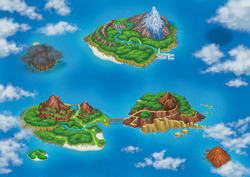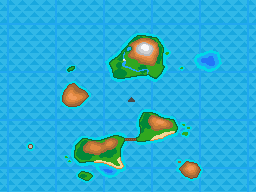Oblivia: Difference between revisions
m (protected) |
Tiddlywinks (talk | contribs) (Doesn't have "first partner Pokemon") |
||
| (107 intermediate revisions by 61 users not shown) | |||
| Line 1: | Line 1: | ||
{{ | {{RegionInfobox | ||
|regioncolor=GS | |||
name=Oblivia | | |name=Oblivia | ||
jname=オブリビア | | |jname=オブリビア | ||
tmname=Oblivia | |tmname=Oblivia | ||
image= | |image=Oblivia artwork.png | ||
|introduction=[[Pokémon Ranger: Guardian Signs]] | |||
|professor=[[Professor Hastings]] | |||
|villain=[[Pokémon Pinchers]] | |||
|pokelist=[[List of Pokémon by Oblivia Browser number|Browser]] | |||
}} | }} | ||
'''Oblivia''' (Japanese: ''' | '''Oblivia''' (Japanese: '''オブリビア地方''' ''Oblivia-chihō'') is the [[region]] in which [[Pokémon Ranger: Guardian Signs]] takes place. This region is an archipelago composed of several islands located far to the south of both [[Fiore]] and [[Almia]]. It has many ruins and legends. In the past, it had temples used to worship Pokémon, such as {{p|Arceus}}. Across Oblivia are monuments that, when lit, form the [[Ranger Sign]] for {{p|Latias}} and {{p|Latios}}. Also, in some places there are monuments that, when specific side quests are completed, reveal special signs for certain Pokémon that can join your team. | ||
== | ==Design concept== | ||
Oblivia may be based on the {{wp|Oki Islands}} in {{wp|Japan}}. | |||
=== | ==History== | ||
{{incomplete|section}} | |||
A long time ago, there were many temples in Oblivia. They included the [[Forest Temple|Forest]], [[Fire Temple|Fire]], [[Ice Temple|Ice]], [[Thunder Temple|Thunder]], [[Dark Temple|Dark]], [[Light Temple|Light]] and [[Odd Temple]]s. The oracles in the temples wore a form of armor, and were called [[Steelhead|Steelheads]]. The armor let them control Pokémon. Each temple had a captain, who controlled an exceptionally strong Pokémon. | |||
==Geography== | |||
Oblivia consists of three major islands and four minor ones. There are many places all over the region where [[legendary Pokémon]] reside. | |||
===Notable locations=== | |||
[[File:Oblivia-Map.png|thumb|An in-game map of Oblivia]] | |||
[[File:Oblivia anime.png|thumb|300px|Oblivia in the {{pkmn|anime}}]] | |||
====Islands==== | |||
* [[Dolce Island]] | |||
* [[Renbow Island]] | |||
* [[Mitonga Island]] | |||
* [[Faldera Island]] | |||
* [[Sophian Island]] | |||
* [[Layuda Island]] | |||
* [[Tilikule Island]] | |||
====Settlements==== | |||
* [[Cocona Village]] | |||
* [[Tilt Village]] | |||
* [[Aqua Resort]] | |||
====Landmarks==== | |||
* {{ra|Sky}} | |||
* [[Teakwood Forest]] | |||
* [[Rasp Cavern]] | |||
* [[Lapras Beach]] | |||
* [[Coral Sea]] | |||
* [[Curl Bay]] | |||
* [[Rand's House]] | |||
* [[Mt. Latolato]] | |||
* [[Latolato Trail]] | |||
* [[Wireless Tower]] | |||
* [[Hinder Cape]] | |||
* [[Mitonga Road]] | |||
* [[Noir Forest]] | |||
* [[Old Mansion]] | |||
* [[Daybreak Ruins]] | |||
* [[Dangerous Cliff]] | |||
* {{ra|Submarine}} | |||
* [[Sophian Road]] | |||
* [[Canal Ruins]] | |||
* [[Silver Falls]] | |||
* [[Mt. Sorbet]] | |||
* [[Oblivia Ruins]] | |||
* [[Eastern Sea]] | |||
* [[Western Sea]] | |||
* [[Rainbow Dais]] | |||
* [[Sky Fortress]] | |||
==Trivia== | ==Trivia== | ||
--> | * The names of Oblivia's islands are based on the seven {{wp|solfège|solfège syllables}} of music notation, do, re, mi, fa, so, la, and ti: [[Dolce Island|'''Do'''lce Island]], [[Renbow Island|'''Re'''nbow Island]], [[Mitonga Island|'''Mi'''tonga Island]], [[Faldera Island|'''Fa'''ldera Island]], [[Sophian Island|'''So'''phian Island]], [[Layuda Island|'''La'''yuda Island]] and [[Tilikule Island|'''Ti'''likule Island]]. | ||
{{-}} | |||
{{ | ==Names== | ||
{{ | {| class="roundy" style="background: #{{GS color light}}; border: 3px solid #{{GS color}}" | ||
{{ | ! Language | ||
! Name | |||
! Origin | |||
|- style="background:#FFF" | |||
| Japanese | |||
| オブリビア ''Oblivia'' | |||
| From ''oblivion'' (state of being forgotten) | |||
|- style="background:#FFF" | |||
| English, German, Spanish,<br>French, Italian, Portuguese | |||
| Oblivia | |||
| Same as Japanese name | |||
|}{{-}} | |||
{{Oblivia}}<br> | |||
{{Regions|GS}}<br> | |||
{{DoubleProjectTag|Locations|Sidegames|every location in the Pokémon world and the Pokémon Sidegames, respectively.}} | |||
[[Category:Regions]] | [[Category:Regions]] | ||
[[Category:Pokémon Ranger]] | [[Category:Pokémon Ranger]] | ||
[[Category:Oblivia]] | |||
[[de:Oblivia]] | [[de:Oblivia]] | ||
[[es:Oblivia]] | [[es:Oblivia]] | ||
[[fr:Oblivia]] | |||
[[it:Oblivia]] | |||
[[ja:オブリビア地方]] | |||
[[zh:奥卜利比亚地区]] | |||
Latest revision as of 01:46, 10 March 2024
| |||||||||||||
| |||||||||||||
| |||||||||||||
| |||||||||||||
Oblivia (Japanese: オブリビア地方 Oblivia-chihō) is the region in which Pokémon Ranger: Guardian Signs takes place. This region is an archipelago composed of several islands located far to the south of both Fiore and Almia. It has many ruins and legends. In the past, it had temples used to worship Pokémon, such as Arceus. Across Oblivia are monuments that, when lit, form the Ranger Sign for Latias and Latios. Also, in some places there are monuments that, when specific side quests are completed, reveal special signs for certain Pokémon that can join your team.
Design concept
Oblivia may be based on the Oki Islands in Japan.
History

|
This section is incomplete. Please feel free to edit this section to add missing information and complete it. |
A long time ago, there were many temples in Oblivia. They included the Forest, Fire, Ice, Thunder, Dark, Light and Odd Temples. The oracles in the temples wore a form of armor, and were called Steelheads. The armor let them control Pokémon. Each temple had a captain, who controlled an exceptionally strong Pokémon.
Geography
Oblivia consists of three major islands and four minor ones. There are many places all over the region where legendary Pokémon reside.
Notable locations

Islands
- Dolce Island
- Renbow Island
- Mitonga Island
- Faldera Island
- Sophian Island
- Layuda Island
- Tilikule Island
Settlements
Landmarks
- Sky
- Teakwood Forest
- Rasp Cavern
- Lapras Beach
- Coral Sea
- Curl Bay
- Rand's House
- Mt. Latolato
- Latolato Trail
- Wireless Tower
- Hinder Cape
- Mitonga Road
- Noir Forest
- Old Mansion
- Daybreak Ruins
- Dangerous Cliff
- Submarine
- Sophian Road
- Canal Ruins
- Silver Falls
- Mt. Sorbet
- Oblivia Ruins
- Eastern Sea
- Western Sea
- Rainbow Dais
- Sky Fortress
Trivia
- The names of Oblivia's islands are based on the seven solfège syllables of music notation, do, re, mi, fa, so, la, and ti: Dolce Island, Renbow Island, Mitonga Island, Faldera Island, Sophian Island, Layuda Island and Tilikule Island.
Names
| Language | Name | Origin |
|---|---|---|
| Japanese | オブリビア Oblivia | From oblivion (state of being forgotten) |
| English, German, Spanish, French, Italian, Portuguese |
Oblivia | Same as Japanese name |
| Oblivia | ||||||
|---|---|---|---|---|---|---|
|
| ||||||
| ||||||
| Regions in the Pokémon world | ||
|---|---|---|

|
This article is part of both Project Locations and Project Sidegames, Bulbapedia projects that, together, aim to write comprehensive articles on every location in the Pokémon world and the Pokémon Sidegames, respectively. | 
|

